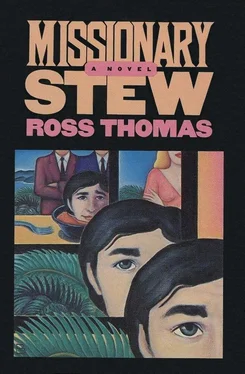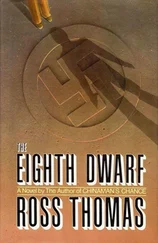Ross Thomas - Missionary Stew
Здесь есть возможность читать онлайн «Ross Thomas - Missionary Stew» весь текст электронной книги совершенно бесплатно (целиком полную версию без сокращений). В некоторых случаях можно слушать аудио, скачать через торрент в формате fb2 и присутствует краткое содержание. Город: New York, Год выпуска: 1983, ISBN: 1983, Издательство: Simon & Schuster, Жанр: Политический детектив, на английском языке. Описание произведения, (предисловие) а так же отзывы посетителей доступны на портале библиотеки ЛибКат.
- Название:Missionary Stew
- Автор:
- Издательство:Simon & Schuster
- Жанр:
- Год:1983
- Город:New York
- ISBN:978-0-671-49363-9
- Рейтинг книги:3 / 5. Голосов: 1
-
Избранное:Добавить в избранное
- Отзывы:
-
Ваша оценка:
- 60
- 1
- 2
- 3
- 4
- 5
Missionary Stew: краткое содержание, описание и аннотация
Предлагаем к чтению аннотацию, описание, краткое содержание или предисловие (зависит от того, что написал сам автор книги «Missionary Stew»). Если вы не нашли необходимую информацию о книге — напишите в комментариях, мы постараемся отыскать её.
Missionary Stew — читать онлайн бесплатно полную книгу (весь текст) целиком
Ниже представлен текст книги, разбитый по страницам. Система сохранения места последней прочитанной страницы, позволяет с удобством читать онлайн бесплатно книгу «Missionary Stew», без необходимости каждый раз заново искать на чём Вы остановились. Поставьте закладку, и сможете в любой момент перейти на страницу, на которой закончили чтение.
Интервал:
Закладка:
On the night that Haere flew in from Denver, he took a taxi from the airport to the cat hotel, ransomed Hubert, and tipped the driver ten dollars to lug the cat carrier up the stairs, which was something Haere didn’t want to attempt with his bandaged hands. After freeing Hubert, Haere got into pajamas, robe, and slippers. Next year, he thought, a tasseled nightcap.
His wondrous refrigerator’s automatic ice-maker and cold-water dispenser enabled him to mix a Scotch and water without too much difficulty. He had just taken the second long swallow when the downstairs buzzer rang. Haere crossed to the intercom, pressed the button, and asked: “Who is it?”
“This is the FBI, Mr. Haere,” said a man’s voice made thin by the small speaker. “We’d like to talk to you.”
“Who’s we?”
“I’m Special Agent Yarn. Special Agent Tighe is with me.”
“How do you spell Tighe?” The voice spelled it for him.
“What do you and Special Agent Tighe want to talk to me about at eleven o’clock at night?”
“We’d rather not discuss that down here on the street.”
“Who’s in charge of your San Francisco office?”
A name was offered promptly. It meant nothing to Haere, but because there had been no hesitation he pushed the button that sounded a buzzer and unlocked the downstairs street door. A moment later he could hear the footsteps on the uncarpeted stairs that led up to his apartment.
FBI agents were no novelty to Haere, not since the early fifties when they had started coming around to investigate his father’s old friends. In the sixties they had come around wanting to know if some of Draper Haere’s older friends were really fit to serve in the higher reaches of the Kennedy and Johnson administrations. By the early seventies the agents were back wanting to know about the bomb-throwing tendencies of some of the children of those older friends.
But back in the fifties, FBI agents to Haere had seemed stern elders of the law, sober-sided, grim, forbidding. They grew younger over the years, of course. The two who appeared on Haere’s doorstep that night were mere tykes, neither a year over thirty-two. One was blond, the other brunette.
“Mr. Haere?” the blond one said.
Haere nodded, and they whipped out their folding ID cases and offered them for inspection. Haere reached for both with his bandaged hands and took his time examining them.
“There was a man I knew in Washington once,” Haere said, still examining the credentials. “Back in the late sixties. A psychologist. He was hired by the FBI to put agents through sensitivity training. It seemed that when some of you guys got home, instead of kissing the wife, you’d whip out your ID at her and say, ‘Carson, FBI.’”
Special Agent Tighe looked at Special Agent Yarn. “I do that all the time, don’t you?”
“Sure,” Yarn said. “Every night.”
Haere handed back their ID cases and told them to come in. The blond one was Yarn, John D. Tighe’s first name was Richard. He had no middle initial. Their hair was neither short nor long. Yarn wore a suit and tie, Tighe a gray herringbone jacket, dark-gray slacks, and no tie. Haere noticed that both wore loafers with rubber heels. Yarn was a little over six feet tall, Tighe a little under. Neither was handsome, neither was ugly. Only their eyes were alike: steady, watchful, and curious. Extremely curious. All four eyes, two brown and two blue, were now taking in Haere’s enormous room.
“Just the one big room, huh?” Yarn said.
“That’s all.”
“Interesting.”
“Different,” Tighe said.
“Sit down,” Haere said.
Yarn sat down on the leather couch that had once graced the Washington office of Senator Wayne Morse of Oregon. Tighe chose the padded walnut armchair that had been in Henry Agard Wallace’s Capitol office when Wallace was Roosevelt’s Vice-President. Haere sat in the old high-backed easy chair he almost always sat in, the Baton Rouge chair, which a dealer in Opelousas had sworn was the last chair Huey Long ever sat in before he was gunned down in 1935. Haere collected political furniture. Political mavericks’ furniture, to be precise. For a year now he had been dickering with a man in Tulsa for a brass spittoon that the almost forgotten Alfalfa Bill Murray of Oklahoma was said to have been partial to.
Yarn took out a black notebook and a ballpoint pen. Hubert jumped up into Tighe’s lap and screamed in his face. Tighe scratched Hubert’s ears absently with the air of a man who knows all about cats. “Lot of Siamese there,” he said.
Haere nodded. “Half.”
“We’d like to talk to you about Mr. John T. Replogle,” Yarn said.
“He’s dead.”
“We know. Tell us about him.”
“Tell you about him?”
“Yes. Please.”
“Well, sir,” Haere said, “he was a hardworking, industrious citizen,and probably the most steadfast and patriotic son of a bitch I ever knew. As for politics, he never belonged to any political party. He was a Democrat.”
Yarn wrote none of that down. Tighe, still scratching the cat’s ears, said, “Mr. Dooley?” without looking up.
“Will Rogers,” Haere said.
“Oh.”
Yarn frowned slightly. “You were with Mr. Replogle — when he died?”
“Yes.”
“Tell us about it.”
“You must have the Colorado Highway Patrol’s report by now.”
“We’ve got it,” Tighe said, “but we’d like you to tell us about it, if you don’t mind.”
“Why?”
“You said it was no accident,” Yarn said. “That it was intentional. If so, Mr. Replogle could have been murdered. If he was murdered, then there’s the possibility that his civil rights were violated. If so, the Bureau is interested — definitely, officially.”
“Your instructions are coming out of Washington?”
Yarn nodded. “Out of Washington.”
Haere told them about the drive from the Brown Palace to Idaho Springs, where he had first noticed the blue Dodge pickup. He then described the drive into the mountains and estimated they had gone approximately fifteen or sixteen miles when it happened.
“It was actually fourteen point three miles,” Tighe said. “Past Idaho Springs.”
It was Yarn’s turn again. “What’d you and Mr. Replogle talk about on the way up? — if you don’t mind us asking.”
Haere shrugged. “Death and dying. Thanksgiving. Old times. He had terminal cancer. Of the prostate.”
“We know,” Yarn said.
“Was he despondent, apprehensive?” Tighe said.
“Well, he wasn’t exactly looking forward to it.”
“What I mean is, did he seem to think that anyone was trying to kill him?”
“No.”
It was again Yarn’s turn. “Did he mention Singapore?”
“He said he’d been there recently.”
“Did you ever know a Drew Meade?”
“A long time ago.”
“Mr. Replogle also knew him.”
“That’s right.”
“Did Mr. Replogle tell you he had seen Mr. Meade in Singapore?”
“He mentioned it.”
“What did he say? — exactly, if you can.”
“He said Mr. Meade looked like something out of Somerset Maugham.”
“ ‘The Casuarina Tree?’ ” said Tighe.
“He wasn’t quite that specific.”
“What did they talk about?”
“Money.”
Yarn looked interested. “Can you give us a little more detail?”
“Sure. Meade didn’t have any and he wanted Jack Replogle to lend him some.”
“Did he?”
“Probably. Mr. Replogle was not only an extremely industrious and patriotic citizen, he was also a very soft touch.”
“So he lent or gave Meade some money?” Tighe said.
“I didn’t say that. I said probably.”
There was a brief silence. Tighe scratched Hubert’s ears some more. Yarn wrote something in his black notebook. When he was finished, he looked up at Haere and said, “Is there anything else you can remember about what Mr. Replogle and Mr. Meade discussed?”
Читать дальшеИнтервал:
Закладка:
Похожие книги на «Missionary Stew»
Представляем Вашему вниманию похожие книги на «Missionary Stew» списком для выбора. Мы отобрали схожую по названию и смыслу литературу в надежде предоставить читателям больше вариантов отыскать новые, интересные, ещё непрочитанные произведения.
Обсуждение, отзывы о книге «Missionary Stew» и просто собственные мнения читателей. Оставьте ваши комментарии, напишите, что Вы думаете о произведении, его смысле или главных героях. Укажите что конкретно понравилось, а что нет, и почему Вы так считаете.












